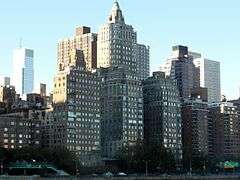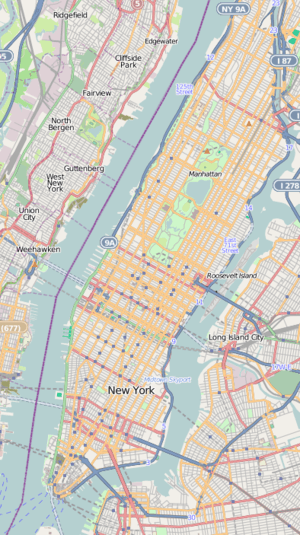River House (New York City)
| River House | |
|---|---|
 | |
 | |
| General information | |
| Type | Housing cooperative |
| Architectural style | Art Deco |
| Address | 435 East 52nd Street |
| Town or city | New York, NY |
| Country | US |
| Coordinates | 40°45′17″N 73°57′47″W / 40.754613°N 73.963000°WCoordinates: 40°45′17″N 73°57′47″W / 40.754613°N 73.963000°W |
| Construction started | 1930 |
| Completed | 1931 |
| Technical details | |
| Floor count | 26 |
| Design and construction | |
| Architecture firm | Bottomley, Wagner & White[1] |
River House is a co-op apartment building located at 435 East 52nd Street in Manhattan, New York.[2]
History
The River House was constructed in 1931 on the site of a former cigar factory.[3] Originally, the building featured a pier where residents could dock their yachts, but that amenity was lost with the construction of the FDR Drive.[3] The building has a gated cobblestone courtyard featuring a fountain.[3] The building's 26 story tower is decorated in an Art Deco style.[4]
Historically, the co-op board was notorious for turning away applicants who failed to meet strict liquidity requirements or those whose "comings and goings would attract unwelcome publicity to the River House".[3] Famously, Gloria Vanderbilt was rejected by the board in 1980.[3] She accused the board of racism (she was in a relationship with African-American singer Bobby Short), while the board claimed she had been rejected on her merits.[5] Other celebrities alleged to have been rejected by the board include Richard Nixon, Diane Keaton, Joan Crawford[3][5] and lately the French Ambassador to the United Nations.[6]
The River Club
Parts of the lower levels of the building are leased to the River Club, a private club that counts slightly more than half of the building's shareholders among its 900 or so members.[3][4] As of 2013 the members, who include David H. Koch and Aerin Lauder, pay approximately $10,000 in annual membership fees.[3] The club includes a restaurant, an indoor pool and tennis courts.[3]
After several years of negotiations where the club attempted to negotiate the purchase of its space, the co-op board listed the club's space for sale as a private residence.[4] Featuring approximately 62,000 square feet (5,800 m2), five floors and a private entrance, the board set an asking price of $130 million.[4] If the asking price is met, it would be Manhattan's most expensive residence.[4]
Notable residents
- Edwin Howard Armstrong, inventor of FM radio[2]
- Catherine "Deeda" (Gerlach) Blair, wife of ambassador William McCormick Blair, Jr.[3]
- Donald M. Blinken, ambassador[3]
- Barbara Taylor Bradford, author[3]
- Henry Kissinger, United States Secretary of State[3]
- Joshua Logan, writer and director[5]
- Alexandra Penney, author and magazine editor[3]
- Holly Peterson, author[3]
- Peter George Peterson, businessman and United States Secretary of Commerce[3]
- Kermit Roosevelt, explorer and son of Theodore Roosevelt[3]
- Robert Rosenkranz
- Uma Thurman, actor[3]
- Philip Bobbitt, author, academic[7]
References
- ↑ "William L. Bottomley (1883-1951)". Avery Architectural & Fine Arts Library. Columbia University Libraries. Retrieved December 7, 2013.
- 1 2 Adams, Michael Henry (November 11, 2009). "Great Houses of New York: River House, the Best Address, Part IV". The Huffington Post. Retrieved December 7, 2013.
- 1 2 3 4 5 6 7 8 9 10 11 12 13 14 15 16 17 18 Bernstein, Jacob (November 6, 2013). "Roiling the Waters at River House". The New York Times. Retrieved December 7, 2013.
- 1 2 3 4 5 Barbanel, Josh (September 25, 2013). "A View and a Price, Both Astounding". The Wall Street Journal. Retrieved December 7, 2013.
- 1 2 3 Burns, Cherie (June 9, 1980). "Gloria Vanderbilt Charges Bigotry, but a Co-Op Says She Was Snubbed on Her Merits". People. Retrieved December 7, 2013.
- ↑ Josh, Barnabel. "Manhattan Co-op Review Foils French Buying Bid". Wall Street Journal. Retrieved 29 July 2014. The WSJ cites "worries about noisy soirees, armed guards and diplomatic immunity" as reasons for the deal falling through.
- ↑ "Co-ops Chill, Condos Don't". The New York Times. 26 January 2014 – via New York Times.